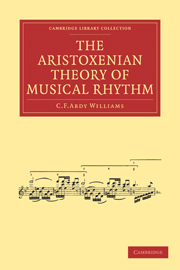Book contents
- Frontmatter
- PREFACE
- Contents
- MUSICAL ILLUSTRATIONS
- INTRODUCTION
- CHAPTER I
- CHAPTER II
- CHAPTER III
- CHAPTER IV
- CHAPTER V
- CHAPTER VI
- CHAPTER VII
- CHAPTER VIII
- CHAPTER IX
- CHAPTER X
- APPENDIX A Quotations, from original sources, of passages referred to in the text
- APPENDIX B Glossary of Technical Terms
- APPENDIX C Dactylo-epitritic, Logaœdic, and Dochmiac rhythms, and rhythmical modulation. M. Laloy's views
- INDEX
- Frontmatter
- PREFACE
- Contents
- MUSICAL ILLUSTRATIONS
- INTRODUCTION
- CHAPTER I
- CHAPTER II
- CHAPTER III
- CHAPTER IV
- CHAPTER V
- CHAPTER VI
- CHAPTER VII
- CHAPTER VIII
- CHAPTER IX
- CHAPTER X
- APPENDIX A Quotations, from original sources, of passages referred to in the text
- APPENDIX B Glossary of Technical Terms
- APPENDIX C Dactylo-epitritic, Logaœdic, and Dochmiac rhythms, and rhythmical modulation. M. Laloy's views
- INDEX
Summary
Ancient Greek music was a branch of the system in vogue throughout the Babylonian and Egyptian civilisations. This system still exists in a modified form under the name of Byzantine music, and can be heard, not only in many of the oriental Christian churches, but in the folksongs of Greece, and, strange to say, Brittany.
Both in melody and rhythm, Greek music became more highly developed in certain directions than modern western music, while in others it remained behind, notably in that it never arrived at anything analogous to what we know as harmony and counterpoint. Where we use harmony as a means of expression, the ancients made use of subtle divisions of the octave, foreign to our ear, and melodic intervals forbidden by our theorists. In rhythm they largely employed the quintuple species, which as yet is scarcely known to us, and subtle combinations of time-values, demanding a highly trained rhythmical sense for their due appreciation.
Music undoubtedly has a mysterious power over the mind, and to this must be attributed the fact that the ancients credited its supposed founders with miraculous gifts. To the mythical Thracian Orpheus, called by Pindar the “Father of Song,” Apollo presented a lyre, by whose sounds not only men and wild beasts, but even trees and rocks were so fascinated that they followed the player, and the powers of Hades were moved by it to restore to Orpheus his dead wife Euridice.
- Type
- Chapter
- Information
- The Aristoxenian Theory of Musical Rhythm , pp. 9 - 23Publisher: Cambridge University PressPrint publication year: 2009First published in: 1911

